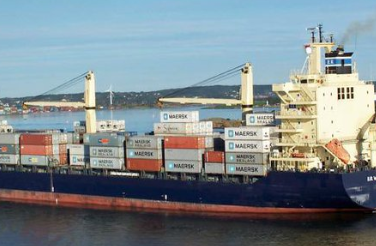Iran’s Houthi Militia forces are making their aggressive moves once again.
In a significant resurgence of hostilities, Yemen’s Houthi rebels launched a suspected missile attack on a container ship in the Gulf of Aden. This assault marks the first instance of Houthi aggression since Israeli airstrikes targeted the group, ending a two-week pause in attacks on shipping routes through the Red Sea corridor.
The attack, which occurred approximately 225 kilometers southeast of Aden, struck a vessel suspected to be the Liberian-flagged container ship Groton. Although a missile hit the ship, reports from the British military’s United Kingdom Maritime Trade Operations center confirmed no fires, water ingress, or oil leaks were observed. The Houthis have not immediately claimed responsibility for the attack, a delay not uncommon in their operational pattern.
Houthis say they targetted Liberian-flagged container Groton passing Gulf of Aden for links to company that operates ships to Israel: Statement
UKMTO says Groton suffered no damage in the Houthi missile attack while sailing from UAE to Djibouti, where she is currently anchored. pic.twitter.com/nfofGBLaYD
— Dhairya Maheshwari (@dhairyam14) August 4, 2024
The resumption of attacks follows the assassination of Hamas leader Ismail Haniyeh in Iran, the Houthis’ primary benefactor. This incident has heightened fears of a regional conflict escalation. The assassination came shortly after an Israeli airstrike in Beirut killed Fuad Shukr, the deputy leader of Hezbollah, a group allied with the Houthis within the Axis of Resistance network backed by Iran.
The Houthis’ missile campaign, which began in November, has targeted over 70 vessels, resulting in four sailor deaths and numerous vessel damages, including one seized and two sunk ships. The rebels claim their attacks aim to disrupt shipping linked to Israel, the US, or Britain to pressure an end to the Israel-Hamas conflict in Gaza. Despite their assertions, many attacked ships have had minimal or no connection to the ongoing war, including vessels bound for Iran.
The Houthis have also extended their attacks to drones and missiles aimed at Israel. Notably, a July 19 attack on Tel Aviv killed one person and injured at least eight others. Israel retaliated with airstrikes on the Houthi-held port city of Hodeida, targeting fuel depots and electrical stations.
In response to the renewed aggression and the potential for further escalation, the US military has bolstered its presence in the Middle East. The USS Abraham Lincoln aircraft carrier strike group is being deployed to the region, replacing the USS Theodore Roosevelt, currently in the Gulf of Oman. Additional naval forces are stationed in the Mediterranean Sea, prepared for possible regional evacuations.
Missile attack by Yemen’s Houthi rebels hits container ship in first attack in 2 weeks #Houthis #Yemen #Hamas #Israelhttps://t.co/hZP4Fj5mhP
— CBRN (@CBRN_Analyst) August 4, 2024
Key Points:
i. Attack Details: A suspected missile attack by Yemen’s Houthi rebels struck a container ship traveling through the Gulf of Aden, marking the first assault since Israeli airstrikes targeted the Houthis.
ii. Attack Aftermath: The missile hit the vessel, but no fires, water ingress, or oil leaks were observed. The vessel targeted was likely the Liberian-flagged container ship Groton.
iii. Houthis’ Response: The Houthis have not immediately claimed the attack, though their assaults typically target ships linked to Israel, the US, or Britain as part of their campaign against the Israel-Hamas war.
iv. Regional Tensions: The attack follows the assassination of Hamas leader Ismail Haniyeh in Iran and an Israeli airstrike on Hezbollah’s deputy leader in Beirut, heightening regional conflict concerns.
v. US Military Involvement: In response to escalating tensions, the US military has moved additional forces to the Middle East, including a fighter jet squadron and the USS Abraham Lincoln aircraft carrier strike group.
James Kravitz – Reprinted with permission of Whatfinger News


